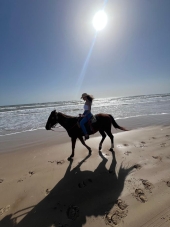












Brenda
Bloom where you are planted.
http://restfultrailsfoodforestgarden.blogspot.com/




Brenda Groth wrote:
don't buy the first piece of property you find, unless it is spectacular..there is so much out there available right now.
i wish we had bought land with running water on it like a creek, river or a lake..we have a pond but would have rather had a natural water source..
get as much acerage as you feel you'll need right off the bat..and if you can get a few buildings on the property ready made, all the better.
make sure the well is good.
make sure the drainage is good
test the soil




Sometimes the answer is not to cross an old bridge, nor to burn it, but to build a better bridge.

















"Limitation is the mother of good management", Michael Evanari
Location: Southwestern Oregon (Jackson County), Zone 7




Idle dreamer




"the qualities of these bacteria, like the heat of the sun, electricity, or the qualities of metals, are part of the storehouse of knowledge of all men. They are manifestations of the laws of nature, free to all men and reserved exclusively to none." SCOTUS, Funk Bros. Seed Co. v. Kale Inoculant Co.








girla wrote:
.the taxes doubled the first year.
Idle dreamer








Iterations are fine, we don't have to be perfect
My 2nd Location:Florida HardinessZone:10 AHS:10 GDD:8500 Rainfall:2in/mth winter, 8in/mth summer, Soil:Sand pH8 Flat
 1
1




Sometimes the answer is nothing







Iterations are fine, we don't have to be perfect
My 2nd Location:Florida HardinessZone:10 AHS:10 GDD:8500 Rainfall:2in/mth winter, 8in/mth summer, Soil:Sand pH8 Flat
 1
1




Creating edible biodiversity and embracing everlasting abundance.
 2
2








Bless your Family,
Mike
 8
8




I want to be 15 again …so I can ruin my life differently.
















 8
8




Blog: 5 Acres & A Dream
Books: Kikobian Books | Permies Digital Market
 9
9




 2
2




I want to be 15 again …so I can ruin my life differently.
 4
4




I don't own the plants, they own me.
 8
8




I want to be 15 again …so I can ruin my life differently.
 1
1




John F Dean wrote:Hi Matt
You sound normal. I just spent two days chasing escaped goats ( goat chasing is not a planned activity). No matter how I tightened the fencing, they got out. Finally, I watched in amazement as all laws of physics were suspended and one walked through a solid fence. I walked to the spot and could not see a problem. Then I touched the fence and it separated. It seems, when I was installing the fence, I had butted two ends together and forgot to fasten them. Amazingly, the two ends did not curl and stayed touching. Even more amazing, it took two years for the goats to discover this.
 3
3




 2
2




 1
1




"Every house where love abides and friendship is a guest, is surely home - and home sweet home - for there the heart can rest." ~Henry Van Dyke
 2
2




I want to be 15 again …so I can ruin my life differently.












 2
2




Rebecca Blake wrote:Leigh, do you have one good resource I could turn to on how to feed my soil ecosytem? I already have an intellectual understanding of this but don't know how to carry it out in practice...
Blog: 5 Acres & A Dream
Books: Kikobian Books | Permies Digital Market
 2
2




Tonya Hunte wrote:Hey Rebecca, Im also new to permaculture, like yourself I started out just after covid struck. I'm sure there are actually many of us who put the pieces of the puzzle together right around the same time, in fact. I don't have anything of worth to add, just wanted to say hi, and let you know that there are likely quite a few of us starting out on this journey right now. In fact, I think I'll post a topic, pointing back to this one... :)
 2
2




John F Dean wrote:Hi Rebecca,
The answer to homestead sitting can come in several approaches. My first choice is responsible children from a nearby homestead/ farm. Be sure to get the parents permission and pay well.
I am assuming a morning check on food and water.
My second choice is the local FFA or 4H to identify someone.
I have learned to trust responsible children more than I trust adults. Twice I have had adults fail without damage.....because I got a bad feeling and cut my trip short. I have never had a young teen fail me. Oh the adults? The first one showed up but left because she was afraid of my cat. The second one, after promising me he would check daily , never showed ....but he was thinking about it. In both cases I had left ample amounts of water and food just in case.
 2
2




Leigh Tate wrote:
Yes! A Soil Owner's Manual by Jon Stika. That link will take you to the book's Permies page. It's the book that put all the puzzle pieces together for me. I could finally see the big picture, plus it gave me a plan to work toward better soil. It's an excellent book and you won't be disappointed!
 7
7




Today is a very exciting time in my life. I am on a wonderful adventure and will never go through this particular experience again.

|
Time is the best teacher, but unfortunately, it kills all of its students - Robin Williams. tiny ad:
Looking for cold-climate growers to join a GOOF livestream panel (Missoula)
https://permies.com/t/369111/cold-climate-growers-join-GOOF
|






